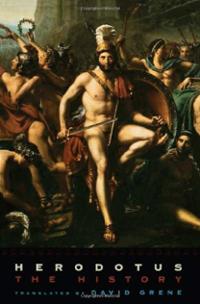“For my part I am not going to say about these matters that they happened thus or thus, but I will set my mark upon that man that I myself know began unjust acts against the Greeks, and having so marked him, I will go forward in my account, covering alike the small and great cities of mankind. For of those that were great in earlier times most have now become small, and those that were great in my time were small in the time before. Since, then, I know that man’s good fortune never abides in the same place, I will mention both alike” (I, 5).

Biography
Herodotus of Halicarnassus was a fifth-century BCE Hellenic traveler and thinker, a student of human beings in all our variety. He is commonly referred to as “the father of history,” an appellation given him by the Roman orator and politician Cicero. Herodotus’ only book, known to posterity as the Histories, is the first complete, extant prose work from the great intellectual flourishing of fifth-century Greece; Thucydides’ History of the Peloponnesian War is the second. [Read More]
Introduction
Herodotus wrote only one book, known today as the Histories. The Greek word that forms its title, historiai, from which our word “history” derives, means inquiries—and so a more accurate title might be the Inquiries of Herodotus of Halicarnassus. [Read More]
Recommended Editions
Featured Video

Clifford Orwin of the University of Toronto lectures on Herodotus’ account of the Athenian and Persian empires at Roosevelt University.


